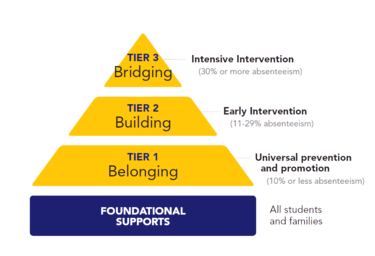The OCDSB strives to create welcoming, inclusive environments for all students, parents and caregivers. We believe that all students strive to do well. When faced with challenges, it is up to us, as adults in their lives, to start from a place of curiosity and compassion. Through this understanding, we can work alongside them to address any barriers that are getting in their way.

The OCDSB District-Wide Strategy for Supporting Student Attendance outlines our plan to make sure every student feels valued, supported and safe so they can attend school every day.
We understand that the reasons for missing school can be complex and often happen due to factors beyond a student’s control. That is why this strategy focuses on being proactive and preventative, bringing together school staff, families and community partners to help all students be present and engaged in their learning.
Why early attendance habits matter
Regular attendance at school is more than just showing up for classes. It’s about being part of a community where children interact with others and build the life skills they need to succeed.
Here is why consistent attendance in school is so important:
- Academic and Skill Development: Regular attendance helps kids build a strong foundation in literacy, math and other subjects, preventing gaps in their knowledge.
- Social-Emotional Growth and Routine: At school, children make friends and develop social skills. A regular routine helps them feel secure and develops a sense of responsibility.
- Mental Health and Well-Being Support: Often, attendance issues can be an early sign of mental health concerns such as anxiety or stress. Addressing attendance problems early is essential for supporting students’ well-being.
- Graduation and Long-Term Success: Consistent attendance in the early years and in high school is a strong predictor of whether a student will graduate. It builds academic achievement, personal responsibility and an understanding of the value of education.
- Family and Community Engagement: Regular attendance helps parents/ caregivers stay involved with their child’s education and connects them with support when concerns begin to arise.
By addressing attendance concerns early, we can get to the root of the issue before it grows, preventing academic setbacks and helping children build habits for a successful future.

Consistent with the OCDSB’s Mental Health and Well-Being Strategy, the OCDSB Attendance Strategy focuses on three priorities - Belonging, Building and Bridging - to make sure we are meeting each student’s needs, from proactive school-wide support to personalized help. This approach allows us to address attendance concerns at different levels, ensuring every student has the chance to succeed.
- Tier 1: Belonging strategies aim to encourage better attendance for all students and prevent absenteeism before it impacts their academic achievement.
- Tier 2: Building interventions help students who are at risk of chronic absenteeism (such as those who have missed up to 29% of the school year). We provide personalized support to remove barriers to attendance for these students and their families.
- Tier 3: Bridging interventions provide intensive, customized support to students missing the most school (30% or more of the school year). This often involves working with schools and other agencies, such as health, housing and social services, to address complex challenges and help students get back on track.
Ontario’s Ministry of Education has set a target attendance rate of 90% for students. Mandatory attendance starts at age 6 or Grade 1. When a student misses 10% or more of the school year (approximately 20 days), this is known as chronic/persistent absence.
Non-consecutive: when a student misses school on separate, non-sequential days.
Consecutive: when a student misses school for two or more days in a row. Parents/caregivers should expect to be contacted by an Attendance Counsellor if a student reaches 11-15 days of consecutive absences.
Students miss school for various reasons, and each situation is unique. When a student is missing school, we need to approach the conversation with curiosity, working with families to understand the root cause. This helps us find solutions that meet each student’s specific needs. Some of the common reasons for missing school are:
- Medical issues or illnesses that may require frequent appointments or treatment
- Not feeling safe or comfortable at school due to racism, discrimination, oppression or bullying
- Stress related to learning, social issues or difficulty in relationships
- Difficulty adjusting to transitions or separating from their parent/caregiver
- Symptoms of mental health concerns interfering with daily life
- Family needs at home (e.g. caring for a sick parent/caregiver or babysitting a younger sibling)
- Difficulty accessing transportation
- Life-changing event or emergency in the family
- Extended visits to home communities/countries
- Technology or substance over-use
- Financial insecurity
- Sleep issues
The OCDSB has many resources to support students and their parents/caregivers. There are many different people who can offer these resources, such as:
- classroom teachers
- learning support teachers
- educational assistants
- principals and vice principals
- guidance counselors
- student success teachers
- school social workers
- school psychology staff
- identity-specific workers
School and central staff can also help connect you with resources and community mental health services. These services are designed to be culturally relevant and responsive.
If your child/youth is having trouble getting to school, is missing an increasing number of days, or has missed a number of days in a row, we encourage you to please reach out to the school. We can work together to put a supportive plan in place.
You can find helpful tips in these resources:
- “A guide for Parents and Caregivers: Supporting your child with school attendance concerns” - This brochure from Parents Lifeline of Eastern Ontario (PLEO) is available in multiple languages.
- “School Refusal: Supporting kids who avoid school” - This article from Parents for Children’s Mental Health and Children’s Mental Health Ontario offers practical advice on how to support children and teens struggling to attend school.
More information and resources
- Laws About Student Attendance in Ontario
- Attendance Works - an American non-profit organization dedicated to promoting equal opportunity to learn and the advancement of student success by reducing chronic absence.
- Best Practices for Parents and Schools Supporting Students with Mental Health Challenges - resource from Parents for Children’s Mental Health and Children’s Mental Health Ontario.